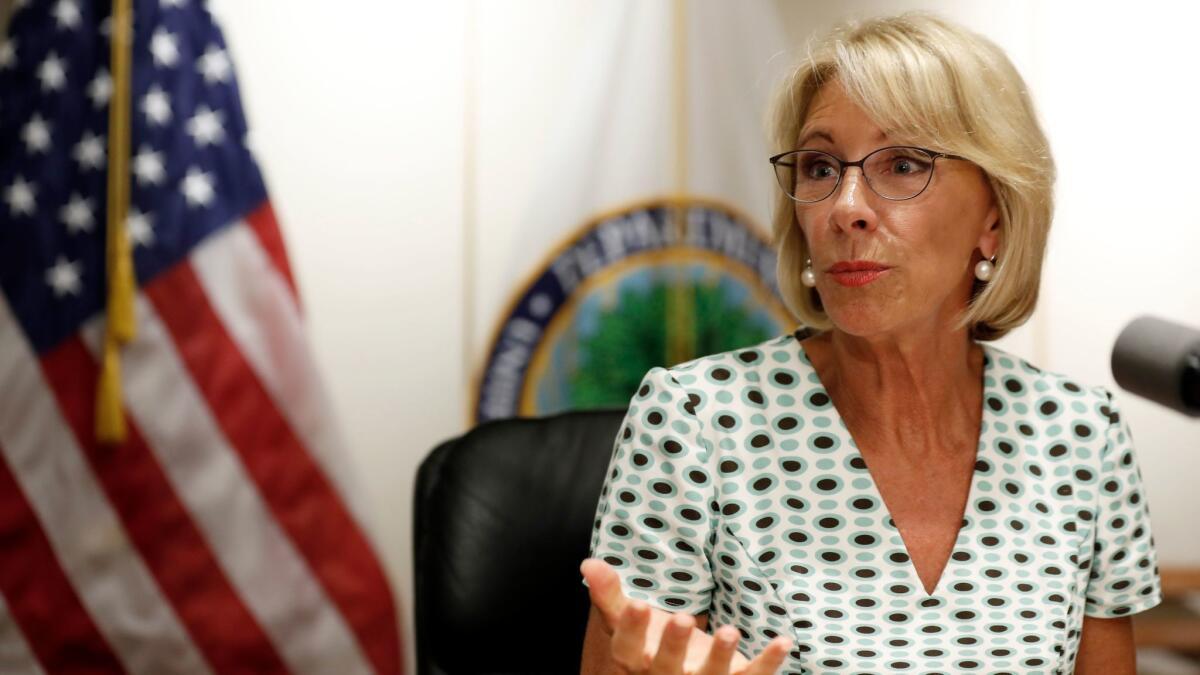Editorial: Hey, Betsy DeVos, keep your hands off campus sexual assault standards

In the long, fraught history of colleges and universities dealing with sexual assault on their campuses, problems have ranged from officials shamefully covering up student complaints to administrators, absurdly, micro-managing how students should signal their consent to sex. Now, the Trump administration is looking for shortcomings in a new area: the guidelines the Obama administration issued for how to enforce Title IX, the 1972 federal statute banning sex-based discrimination in federally funded education programs.
Six years ago, the Department of Education’s Office of Civil Rights offered new guidance to colleges and universities in an effort to clarify just how they should conduct disciplinary proceedings in cases involving complaints of sexual assault. In addition to instructing schools to treat both the accuser and the accused equally, the document said the cases should be decided based on a “preponderance of the evidence” — in other words, whether the accuser offered more evidence that was credible than the accused did. That evidentiary standard is the same one courts use in many civil cases, but it’s not as rigorous as the one for criminal cases, which requires prosecutors to prove a defendant’s guilt “beyond a reasonable doubt.”
The guidance responded to widespread concerns about the alarming incidence of sexual assault on campus, with surveys showing roughly 1 in 5 female students experiencing some form of sexual assault. Nevertheless, it sparked an outcry from advocates for accused students, who claimed that they were not getting fair treatment. Last month, Education Secretary Betsy DeVos, after meeting separately with educators, victims of sexual assault and students who had been accused of assault, signaled that she would look at policies governing sexual assault investigations and consider changing that evidentiary standard. A spokesperson for the secretary said the review was ongoing.
The Department of Education and its Office of Civil Rights should be ensuring that schools are following the guidance that has already been laid down.
DeVos should not make that change. A campus investigation into a complaint of sexual assault is not a criminal proceeding, nor is it a substitute for one. Its goals are different. The aim isn’t to enforce the law; it’s to enforce the rules the campus sets for behavior by its students, staff and faculty. The preponderance-of-the-evidence standard is appropriate for judging alleged violations of any of those rules, whether it be the ones regarding plagiarism, underage drinking or sexual misconduct.
That said, the stakes of a disciplinary proceeding can still be high for all involved, particularly in the case of an alleged sexual assault. Someone who has been assaulted must cope with the trauma of the incident and the potential stress of the investigation. Someone accused faces the possibility of expulsion. That seems fair punishment if the person committed the assault. But if he (or she) is wrongly accused and found responsible anyway, that’s unjustly stigmatizing and costly.
Some accused students have complained that their colleges have violated their due process rights — and some have sued, at times successfully. But the procedural problems they’ve identified were rooted in the way the schools implement the Title IX instructions, not in the preponderance-of-the-evidence standard. An appeals court ruling in the case of two accused students at the University of Cincinnati found that school disciplinary panels were not criminal proceedings, and therefore an accused student didn’t need to have “a full-scale adversarial proceeding.” Rather, the court held, the student simply needed an opportunity to “respond, explain, and defend.”
What is crucial here is that schools respect the rights of both the accuser and the accused, offering them the chance to present witnesses and evidence to investigators and at hearings. Both parties should have the same access to whatever types of advisors are allowed and the same rights to whatever kind of testimony is allowed. This is all part of the written guidance that the Office of Civil Rights has published.
To the extent that schools are pursuing these steps carelessly or truncating the process in a way that puts a thumb on the scales, that is unacceptable. The Department of Education and its Office of Civil Rights should be ensuring that schools are following the guidance that has already been laid down. Office of Civil Rights officials should also welcome school officials’ calls for assistance with this process.
Resolving complaints of campus sexual assault can be rife with challenges. But rescinding the standards and guidance in place will only make the task murkier and more frustrating.
Follow the Opinion section on Twitter @latimesopinion or Facebook
More to Read
A cure for the common opinion
Get thought-provoking perspectives with our weekly newsletter.
You may occasionally receive promotional content from the Los Angeles Times.










